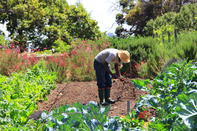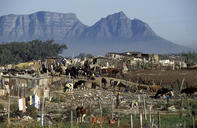Only Part of the Solution
Getting city dwellers to grow their own food is part of the solution to the hunger crisis. Urban food growing is also critical because it shortens the food value chain, which not only shrinks the carbon footprint of food, but also decreases the level of waste because reducing the number of times that fresh produce is handled decreases the likelihood of it being damaged and spoiled.

However, food gardening is only part of the solution; it is not the final answer. There are plenty of reasons why urban food gardens fail in southern African cities: a lack of skills and money to buy seedlings, fertilisers and equipment; vandalism or theft; poor soils; cultural attitudes towards growing food (many poorer communities would rather be seen buying food in a supermarket than growing it themselves, as this is perceived to be what modern, wealthy city dwellers do).
Too Much Risk in Urban Food Gardens
For the poorest out there, who are literally foraging a hand-to-mouth existence, if they have three or four hours of labour to sell on any given day, they need to do it in exchange for cash today, not the promise of a barrow-load of spinach leaves in a few weeks’ time.
This is why some of the most successful gardening projects are those where people in the community are employed to work in the garden and are not expected to carry so much of the risk associated with keeping leafy greens alive.
Since urban agriculture is usually seen as the universal remedy for food and nutritional insecurity in cities, a word of caution is necessary. The food security conversation invariably leans towards agriculture – if people are hungry, we just need to grow more food. There is ample and abundant food in our cities, but it is not spread evenly in communities like a neatly buttered slice of bread.
Dangers of a Production Bias

We need to understand why food gardens do not always work, and that generally calls for a more holistic approach to the problem. There is a real danger that this production bias in the thinking on the issue could even undermine food security efforts. Here is an example: say a city has R5 million to spend on addressing food security needs in its constituency. A production-biased policy will channel all of that budget into rolling out food gardens.
Some of these might work. But what if the reasons for a community becoming more food secure have nothing to do with whether there is enough food in the city – which we have established time and again is often the case?
What if what is needed is for a family to be moved out of vulnerable slum settlements and into bricks-and-mortar houses where they get municipal services, such as water and electricity, which insulates them against extreme weather events associated with a changing climate and where food storage and safety are improved?
What if that food security energy is better spent on ensuring that vulnerable people have jobs so they can earn money to buy food? And what if that effort is better spent educating people about healthy food choices and physical activity? Or what if we banned fast food outlets near schools or any junk food sales from school tuck shops?
Considering Rural and Urban Contexts
Pouring the allocated budget and city energy into urban food gardens would end up neglecting other critical solutions to this broad and complex issue. Another possible problem with urban agriculture is that while it may relieve some of the strain on the environment in rural areas caused by large-scale agriculture, in essence it might merely import those pressures and strains into the city.
Speaking alongside Dr Trusen at the Cape Town panel discussion, University of Cape Town geographer Dr Jane Battersby warns that we should not take a model that has not worked in a rural context and import it into the city.
For instance, the environmental problems associated with agriculture – over-extraction of irrigation water, or fertiliser run-off which pollutes river systems – will not be any easier to address in the urban context than in the rural context. And we certainly should not then expect the poor to have to deal with these additional challenges either.
By Leonie Joubert